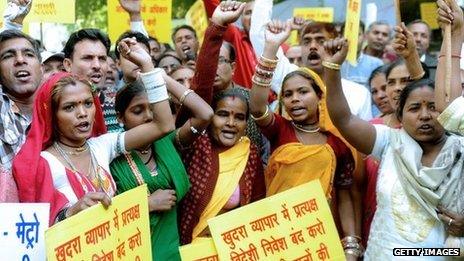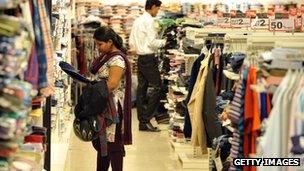Viewpoint: India backs down on promise to open retail
- Published

India is one of the world's fastest growing major retail markets
Reform in democratic India is always a marathon, never a sprint.
The process has a hallowed tradition.
Announcements of major policy reform are accompanied by a crescendo of obstreperous opposition.
Interest groups perceived to be negatively impacted by the policy mobilise to protest, and political parties loudly transmit those views into parliament.
Opinions are widely aired, and every conceivable reason not to proceed with the reform initiative is given a hearing.
Several years later, by the time the policy change is finally passed by parliament, it is almost a damp squib: accepted quietly, as if every protester's vocal cords have long been exhausted.
India's decision to implement the GATT's Uruguay Round agreements in 1994 went through this process, as did insurance reform.
The former took a decade before being quietly passed, the latter nearly six years between the introduction of the bill and its passage by parliament.
The Lokpal or Ombudsman bill to tackle corruption has had the longest gestation period - 43 years, and still counting!
Retail reform
Allowing majority foreign direct investment (FDI) in retail is a reform measure that was first proposed in 2002 by the previous government which was headed by the National Democratic Alliance (NDA).
Unlike Patent or Insurance reform, FDI in retail does not require the passage of a parliamentary bill.
It merely requires an administrative decision, as with all decisions regarding FDI in any sector.
Currently India allows majority foreign ownership of single-brand retail outlets such as Hugo Boss, Lacoste and Nike.
But allowing FDI in multi-brand retail could be potentially much more transformative.
Large retail outlets like Wal-mart, Carrefour and Tesco would introduce efficiencies across the entire supply chain.
It would reduce prices for final consumers and enable farmers and other producers to receive a better price because the middlemen and wholesalers would be eliminated.
Between a third and half of all the fruits and vegetables produced in India are wasted, rotting on the way to market for lack of adequate cold storage and refrigeration.
Large modern retail chains would particularly contribute to reducing such untold wastage.
In fact, the government's policy requires new multi-brand retail stores to invest a minimum of $50m (£32m) towards setting up such "back-end" infrastructure to enhance the quality of the supply chain.
Minority government
The current Congress Party-led United Progressive Alliance (UPA) coalition is actually a minority government, having direct control of 262 seats in the 543-member Lok Sabha or Indian equivalent of the UK's House of Commons.
Of those 262, the second largest bloc of 19 seats is held by the Trinamool Congress which is the ruling party in West Bengal.
Trinamool Congress is implacably opposed to the opening-up of multi-brand retail to majority foreign control.
Without the support of this key coalition ally, the UPA's position in parliament would become even more fragile - especially as the UPA coalition is currently given an additional cushion of support by two parties based in the large state of Uttar Pradesh, which has state elections in April-May 2012.
Those two parties, which will be competing against the Congress in next year's state election, are also cool to the reform initiative.
Consequently, the government cannot immediately push ahead with reforms, which are strongly welcomed by most Indian business leaders, until after the elections in Uttar Pradesh in 2012.
Strong opposition
Local corner or kirana shops that dominate the daily buying experiences of most Indians are most suspicious of the opening-up of FDI to multi-brand retailers as they perceive their businesses being squeezed out.
The government argues that those shops will actually have sufficient scope to survive alongside the large retailers - as indeed they have with the growth of India's own large retail malls which now proliferate across Indian towns large and small.
The new policy, at any rate, applies only to cities with a population of more than a million.
Every state government has the constitutional right to decide whether or not it wants to allow foreign multi-brand retail outlets to open within their states.
Ultimately the government is likely to dilute the initial reform steps and postpone implementation in full until at least next May.

Backing down on a promise would be embarrassing for the government
The UPA government has suffered a long period of political paralysis over the past 15 months, beset by mounting corruption scandals.
The economic momentum was slowing in the absence of economic reform, with real gross domestic product decelerating to 6.9% annual growth in the latest quarter.
The rupee has also been the worst performing currency in Asia this year.
Investor confidence
The liberalisation of FDI in the retail sector held the promise of reversing the image of policy paralysis, and reinvigorating the investment climate.
It was an unusually bold and unexpected reform step that could induce new capital inflows and so help strengthen the rupee without needing to spend India's large $320bn pool of foreign reserves.
The introduction of the policy has already changed the political conversation in India.
Prime Minister Manmohan Singh and Finance Minister Pranab Mukherjee have staked their reputations on pushing through this significant reform.
They are unlikely to succeed immediately.
But, in the deliberative way that usually works for this duo, they are likely to win support for reform later.
They may compromise slightly now, and work to win over key allies with political incentives such as a large fiscal grant to West Bengal.
The state desperately needs it to meet a gaping fiscal hole left by the communist government that ruled it for 34 years until May 2011.
In India's messy, divided democracy, reform never takes giant steps forward.
This time a giant step was attempted which has immediately been followed by a half-giant step backward.
The eventual forward movement will come, but only by the middle of 2012.
Anything sooner will be a bonus.
But the interim period will see some serious setbacks for investor confidence in India.
Prasenjit K. Basu is a Singapore-based Asian regional economist. The opinions expressed are those of the author and are not held by the BBC unless specifically stated. The material is for general information only and does not constitute investment, tax, legal or other form of advice. You should not rely on this information to make (or refrain from making) any decisions. Links to external sites are for information only and do not constitute endorsement. Always obtain independent, professional advice for your own particular situation.
- Published6 December 2011
- Published5 December 2011